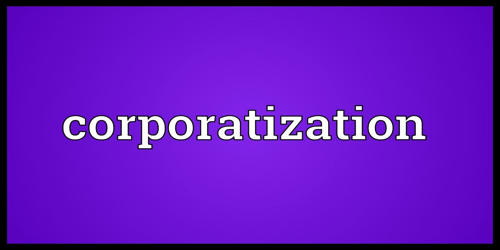Corporatization is the privatization of a publicly-owned organization. It is the process of transforming state assets, government agencies, or municipal organizations into corporations. It refers to the restructuring or transformation of a state-owned asset or organization into a corporation. It refers to a restructuring of government and public organizations into their administration. The result of corporatization is the creation of state-owned corporations where the government retains majority ownership of the corporation’s stock. The main goal of corporatization is to allow the government to retain ownership of the company while allowing the company to run as efficiently as its private counterparts.
Corporatize means to change a government organization into a privately owned company. Corporatization occurs when a government attempts to reorganize the structure of a government-owned entity into one that resembles a private entity. In contrast, the term may also refer to the construction of state corporatism, where state-owned corporations are created and delegated public joint-stock, publicly listed companies, in order to introduce corporate and business management techniques to social tasks resembling corporate nationalism as an alternative to privatization. It is intended to create greater financial transparency, reduce political interference, and strengthen managerial accountability. Corporatization can also refer to non-corporate entities like universities or hospitals becoming corporations or taking up management structures or other features and behaviors employed by corporations.
Features of Corporatized Entities –
- Separate legal entity: the organization is a legally independent entity
- Managerial autonomy: management has control over all inputs and issues related to production or service delivery
- Transparency and reporting: the organization is likely to become subject to prevailing company law and accounting rules
- Assets and liabilities: the corporatized entity will receive the resources it needs to perform its functions and be viable.
Advantage
The advantages of transferring government-owned assets to the private sector are increased efficiency and profits, largely because competition incentivizes innovation and improvement.
- Reducing the cost of maintaining the management office and administration;
- Improving the level of business security;
- Qualitative improvement in the control and management of financial flows;
- Forming your brand through corporation divisions;
- More constructive and overall, with the right organization, an effective sales team;
- Improving the competitiveness of the company by reducing costs in general.
Disadvantage
The disadvantages of Corporatization have decreased regulation and government revenue. Institutions not owned by the government do not directly deliver the government revenue, and these institutions also have more freedom to pursue their own interests, which may negatively affect consumers, without government control.
















